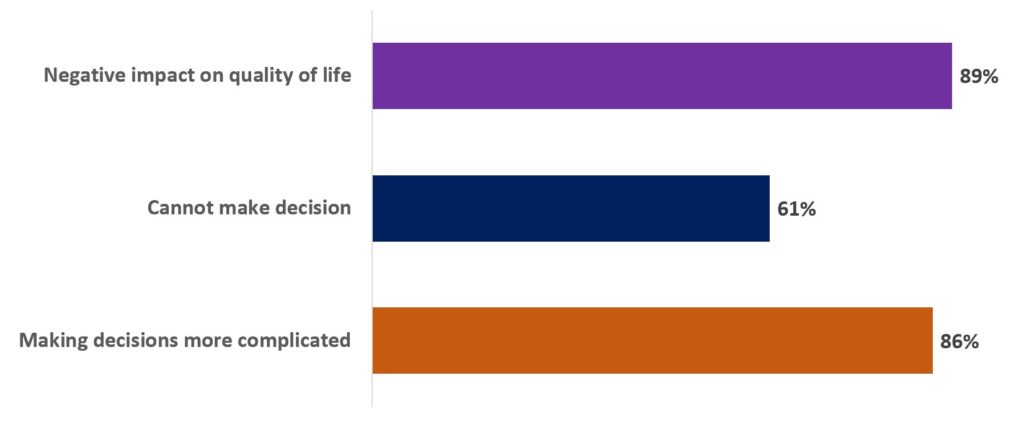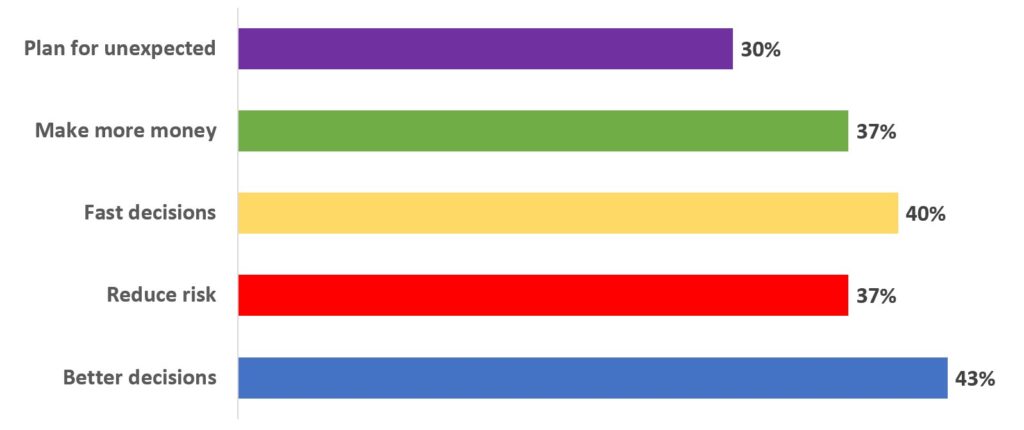The study, The Decision Dilemma, by Oracle and Seth Stephens-Davidowitz, data scientist and author of Everybody Lies and Don’t Trust Your Gut, reveals that people feel overwhelmed and underqualified to use data to make decisions and this is hurting their quality of life and business performance.
The study of more than 14,000 employees and business leaders across 17 countries, including 4,500 respondents from Asia Pacific and Japan (JAPAC), found that people are struggling to make decisions in their personal and professional lives at a time when they are being forced to make more decisions than ever before.
Overwhelmed by data and amount of decisions to make
The study noted that people in JAPAC are overwhelmed by the amount of data and this is damaging trust, making decisions much more complicated, and negatively impacting their quality of life.
Up to 74% of participants in the JAPAC study say the number of decisions they make every day has increased 10x over the last three years and as they try to make these decisions, 75% are getting bombarded with more data from more sources than ever before.
Figure 1: Decision paralysis

About 86% say the volume of data is making decisions in their personal and professional lives much more complicated and 61% admit they face a decision dilemma – not knowing what decision to make – more than once every single day.
The data deluge is causing 89% to concede that this inability to make decisions is having a negative impact on their quality of life. It is causing spikes in anxiety (37%), missed opportunities (37%), and unnecessary spending (35%).
As a result, 92% have changed the way they make decisions over the last three years. 41% now only listen to sources they trust and 31% rely solely on gut feelings.
Stephens-Davidowitz concludes that people are drowning in data. “This study highlights how the overwhelming number of inputs a person gets in their average day frequently adds up to more information than the brain is configured to handle. People are tempted to throw out the confusing, and sometimes conflicting, data and just do what feels right. But this can be a big mistake.

"It has been proven over and over again that our instincts can lead us astray and the best decision-making is done with a proper understanding of the relevant data. Finding a way to get a handle on the stream of data at their fingertips, to help businesses distinguish between the signal and the noise, is a crucial first step."
Seth Stephens-Davidowitz
Decision distress is creating organisational inertia
Business leaders in JAPAC want data to help and know it is critical to the success of their organisations, but do not believe they have the tools to be successful which is eroding their confidence and ability to make timely decisions.
Among business leaders, 87% have suffered from decision distress – regretting, feeling guilty about, or questioning a decision they made in the past year, with 90% believing having the right type of decision intelligence can make or break the success of an organisation.
Figure 2: Value of data at fingertips

Interestingly, 96% want help from data. In an ideal world, they want data to help them: make better decisions (43%), reduce risk (37%), make faster decisions (40%), make more money (37%), and plan for the unexpected (30%).
Not surprisingly, 73% admit the sheer volume of data and their lack of trust in data has stopped them from making any decision at all and 92% believe the growing number of data sources has limited the success of their organisations.
Managing different data sources has required additional resources to collect all the data (47%), made strategic decision-making slower (38%), and introduced more opportunities for error (31%).
Business leaders do not believe that the current approach to data and analytics is addressing these challenges. 74% of JAPAC respondents say that the dashboards and charts they get do not always relate directly to the decisions they need to make and 77% believe most data available is only truly helpful for IT professionals or data scientists.
Business leaders know this needs to change. They believe the right data and insights can help them make better HR (97%), finance (93%), supply chain (95%), and customer experience (93%) decisions.

“As businesses expand to serve customers in new ways, the number of data inputs required to get the full picture expands too. Business leaders that make critical decisions ignore that data at their own risk,” said Chris Chelliah, senior vice president for technology and customer strategy at Oracle Japan and Asia Pacific.
“The hesitancy, distrust, and lack of understanding of data shown by this study align with what we hear from customers rethinking their approach to decision-making."
Chris Chelliah
Relevance to decision-making
Collecting and interpreting data has driven people in JAPAC to their breaking point at a time when the stakes are incredibly high for business leaders. Among business leaders responding to the study, 75% say people often make decisions and then look for the data to justify them, 74% of employees believe businesses often put the highest-paid person’s opinion ahead of data, and 26% of JAPAC respondents feel that most decisions made in business are not rational.
The situation is so challenging that 81% of people and 85% of business leaders would prefer for all these difficulties to just go away and to have a robot make their decisions.
Despite their frustrations with data in their personal and professional worlds, people know that without data their decisions would be less accurate (45%), less successful (32%), and more prone to error (41%).
People also believe that an organisation that uses technology to make data-driven decisions is more trustworthy (77%), will be more successful (77%), is a company they are more likely to invest in (75%), partner with (75%), and work for (76%).

“Business leaders in Asia Pacific are increasingly aware of the role quality data and analytics can play in uncovering deep market and customer insights, disrupting legacy business, and even transforming whole industries,” said Dr Chris Marshall, research VP at IDC.
The latest release of IDC's Worldwide Big Data and Analytics (BDA) Spending Guide for Asia Pacific, indicates that spending on BDA solutions is expected to reach US$70.7 billion by 2026.
"Adopting such a data, analytics and AI-driven approach to digital transformation is becoming table stakes for regional leaders as they look to boost revenues and create greater cost efficiencies in the uncertain economic climate.”
Dr Chris Marshall




